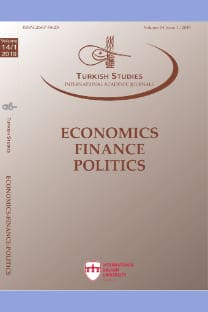G7 Ülkelerinde Turist Sayıları ve Sağlık Harcamaları İlişkisi: Panel Nedensellik Testi
The Relationship of Outgoing Tourist Numbers and Health Expenditures in G7 Countries: Panel Causality Test
___
- Arslan, İ., Eren, M. V. & Kaynak, S. (2016). “Sağlık ile kalkınma arasındaki ilişkinin asimetrik nedensellik analizi”, Dokuz Eylül Üniversitesi İktisadi ve İdari Bilimler Fakültesi Dergisi, 31(2), 287-310.
- Aslan, A. (2014). “Tourism development and economic growth in the mediterranean countries: evidence from panel granger causality tests”, Current Issues in Tourism, 17(4), 363-372.
- Aydın, O. (2012). “Türkiye’de alternatif bir turizm; sağlık turizmi”, KMÜ Sosyal ve Ekonomı̇ k Araştirmalar Dergı̇ si, 14(23), 91-96.
- Belek, İ. (2016). Sağlığın politik ekonomisi sosyal devletin çöküşü, 4. Baskı, Yazılama Yayınevi.
- Breusch, T. & Pagan, A. (1980), “The lagrange multiplier test and its application to model specifications in econometrics”, Rev. Econ. Stud. 47(1) 239–253.
- Burtan D., B., & Aslan A. (2019). “Türkiye'de sağlık turizminin mevcut durumu ve ülke ekonomisine katkıları”, Dicle Üniversitesi İktisadi ve İdari Bilimler Fakültesi Dergisi, 18(9), 391-420.
- Cheah C.F., & Abdul-Rahim A.S. (2014). Tourism, health and income in Malaysia. In: Shs web of conferences. 12. EDP Sciences; 6 p.
- Ecevit, E., Çetin, M., & Yücel, A. G. (2018). “Türki Cumhuriyetlerinde sağlık harcamalarının belirleyicileri: bir panel veri analizi”, Akademik Araştırmalar ve Çalışmalar Dergisi, 10(19), 318-334.
- Emirmahmutoglu, F. & Kose, N., (2011). “Testing for granger causality in heterogeneous mixed panels”, Economic Modelling, 28, 870-876.
- Ersöz, F. (2008). “Türkiye İle OECD Ülkelerinin sağlık düzeyleri ve sağlık harcamalarının analizi”, İstatistikçiler Dergisi, 2, 95-104.
- Gölpek K., A. (2017). “Türkiye’de sağlık turizminin ekonomik yönü”, Türk Sosyal Bilimler Araştırmaları Dergisi, 2(2), 58-69.
- Kalaycı, Ş. (2008). SPSS uygulamalı çok değişkenli istatistik teknikleri, 3. Baskı, Asil Yayıncılık.
- Kozak, N., Kozak, M., & Kozak, M. (2013). Genel turizm, 14. Baskı, Detay Yayıncılık.
- Kuo H., Chen C., Tseng W., Ju L., & Huang, B. (2008). Assessing impacts of SARS and Avian Flu on international tourism demand to Asia. Tourism Management, 29(5), 917-928.
- Kurşun, A. & Rakıcı C. (2014). “Türkiye ve sosyal refah devletlerindeki sağlık harcamalarının analizi”, İnsan Hakları Yıllığı.
- Lee, C.G. (2010). Health care and tourism: evidence from Singapore. Tourism Manag. 31:486–488.
- Lin, Y.H., Chang, T., Chen, W.Y., & Lee, J.L. (2013). “Healthcare expenditure and economics growth nexus in 11 oecd countries: bootstrap panel causality test”, The Empirical Economics Letters, 12(4), 375-385.
- OECD (Organisation for Economic Co-operation and Development) (2019). Web: http://www.oecd.org/health/health-expenditure.htm, Erişim Tarihi: 11.12.2019 tarihinde ulaşılmıştır.
- Özcan, C. C., Aslan, M., & Nazlioglu, S. (2017). Economic freedom, economic growth and international tourism for post-communist (transition) countries: A panel causality analysis. Theoretical and Applied Economics, 24(2), 75-98.
- Öztürk, İ. (2016), “The relationships among tourism development, energy demand, and growth factors in developed and developing countries”, International Journal of Sustainable Development & World Ecology, 23(2), 122-131.
- Pesaran, M. H. (2004), “General diagnostic tests for cross section dependence in panels”, Cambridge Working Papers in Economics, 435, 1-39.
- Pesaran, M. H. Ullah, A. & Yamagata, T. (2008), “A bias-adjusted lm test of error cross-section independence”, Econometrics Journal, Vol. 11, pp. 105-127.
- Qureshi, M. I., Hassan, M. A., Hishan, S., Rasli, A., & Zaman, K. (2017). “Dynamic linkages between sustainable tourism, energy, health and wealth: evidence from top 80 international tourist destination cities in 37 countries”, Journal of Cleaner Production, 158 (1), 143-155.
- Toprak, D. (2019). “Türkiye’de sağlık harcamalarının karşılaştırmalı analizi”, Ekonomi Bilimler Dergisi, 11(1), 24-38.
- Tuncay, N., & Özcan, C. C. (2020). The effect of Dutch disease in the tourism sector: the case of Mediterranean countries. Tourism and hospitality management, 26(1), 97-114.
- TTYD (Türkiye Turizm Yatırımcıları Derneği) (2019). Web: http://ttyd.org.tr/Uploadfiles/DocumentFiles/c3d9642a-3a06-43e8-a9a8-892949d83eba.pdf, Erişim Tarihi: 13.12.2019 tarihinde ulaşılmıştır.
- UNWTO (World Tourism Organization) (2020). Web: https://www.eunwto. org/doi/pdf/10.18111/9789284421152, Erişim Tarihi: 15.01.2020 tarihinde ulaşılmıştır.
- WDI (World Development Indicators) (2019). Web: https://databank.worldbank.org/source/worlddevelopment- indicators#, Erişim Tarihi: 17.12.2019 tarihinde ulaşılmıştır.
- WDI (World Development Indicators) (2019). Web: https://databank.worldbank.org/source/worlddevelopment- indicators#, Erişim Tarihi: 27.02. 2020 tarihinde ulaşılmıştır.
- Wu, F., Hsin P.H., Cheng, M.W., & Fangjhy, L. (2019). “Bootstrap ardl on health expenditure, CO2 emissions, and GDP growth relationship for 18 OECD countries”, Frontiers in Public Health, 7, 1-9.
- Yetiş, Z. (2017). İç kontrol sisteminin işletme performansı üzerindeki etkisi: Otel işletmeleri örneği, Yüksek lisans tezi, Necmettin Erbakan Üniversitesi Sosyal Bilimler Enstitüsü.
- Zaman, K., Shahbaz, M., Loganathan N., & Raza S. A. (2016). “Tourism development, energy consumption and environmental Kuznets curve: trivariate analysis in the panel of developed and developing countries”, Tourism Management, 54, 275-283.
- ISSN: 2667-5625
- Yayın Aralığı: 4
- Başlangıç: 2006
- Yayıncı: ASOS Eğitim Bilişim Danışmanlık Otomasyon Yayıncılık Reklam Sanayi ve Ticaret LTD ŞTİ
Özgül UYAN, Faqir Ahmad HAMIDI
Zafer ADIGÜZEL, Serap TEPE, Oya ERDİL
Özgül UYAN, Faqir Ahmad HAMIDI
Olağanüstü Hal Kararları ve Türk Ordusu: Ordu’nun Savaş Kapasitesi Nasıl Etkilenecek?
Hisse Senedi Piyasası Gelişimi Ekonomik Büyüme Sürecinde Bir Rol Oynar mı? BRICS-T Ülkeleri Örneği
Effects of Oil Prices on Capacity Usage: Panel Data Analysis for G-7 Countries
Entegre Raporlamanın Tarihsel Gelişimi ve Literatür Çalışması
